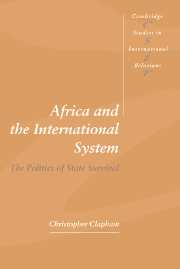Book contents
- Frontmatter
- Contents
- Acknowledgements
- List of acronyms and abbreviations
- Part I African states and global politics
- Part II Patterns of alliance
- Part III Struggling with decay
- 7 The international politics of economic failure
- 8 The Externalisation of political accountability
- 9 The International politics of insurgency
- 10 The privatisation of diplomacy
- 11 Conclusion
- Notes
- Bibliography
- Index
- CAMBRIDGE STUDIES IN INTERNATIONAL RELATIONS 50
11 - Conclusion
Published online by Cambridge University Press: 09 October 2009
- Frontmatter
- Contents
- Acknowledgements
- List of acronyms and abbreviations
- Part I African states and global politics
- Part II Patterns of alliance
- Part III Struggling with decay
- 7 The international politics of economic failure
- 8 The Externalisation of political accountability
- 9 The International politics of insurgency
- 10 The privatisation of diplomacy
- 11 Conclusion
- Notes
- Bibliography
- Index
- CAMBRIDGE STUDIES IN INTERNATIONAL RELATIONS 50
Summary
The encounter between Africa and the Westphalian assumptions of sovereign statehood, built into the practice of European powers and the international system that they created, underlies the entire modern history of the continent. It has been an awkward, ambiguous, unsatisfactory, and often indeed tragic combination. The international relations of African states since most of these became independent in the early 1960s provides no more than one aspect of that encounter. It is, however, one that reveals a great deal, not only about the nature of African statehood, but equally about the way in which the international system has operated in the late twentieth century, and one which has much to offer to students of international relations.
Decolonisation launched into independence close to fifty new states on the African continent and its adjacent islands, together with many more in other parts of the formerly colonised world. Many of these states were militarily and economically incapable of maintaining that independence against any sustained external challenge. Many of them were also riven by internal conflicts. Their independence consequently raised questions both about their own prospects for survival, and about the universal applicability of sovereign statehood as a mechanism for combining a measure of local autonomy with the maintenance of global security.
- Type
- Chapter
- Information
- Africa and the International SystemThe Politics of State Survival, pp. 267 - 274Publisher: Cambridge University PressPrint publication year: 1996

